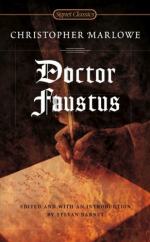|
This section contains 4,779 words (approx. 16 pages at 300 words per page) |

|
SOURCE: "Marlowe's Doctor Faustus as an Inverted Saint's Life," in Studies in Philology, Vol. LXIII, No. 4, July, 1966, pp. 565-77.
In the following essay, Snyder interprets Doctor Faustus as an inverted hagiography, reversing the traditional seven stages toward sainthood and showing Faustus moving away from sanctity rather than to beatitutude.
Critics have long recognized that Doctor Faustus is both a tragedy and a morality play. Because Faustus despairs, tragedy wins out in the end; but along the way semi-allegorical characters periodically wrestle over the soul of Faustus, reminding us of the contrasting medieval pattern of fall and redemption. Mr. Clifford Davidson1 sees significance in Faustus' Wittenberg background and relates his hardened heart to the Lutheran emphasis on the bondage of the will. Such an emphasis, with its concomitant insistence that fallen man has no power to initiate his own repentance, is surely present in the play, underlying the sense...
|
This section contains 4,779 words (approx. 16 pages at 300 words per page) |

|


